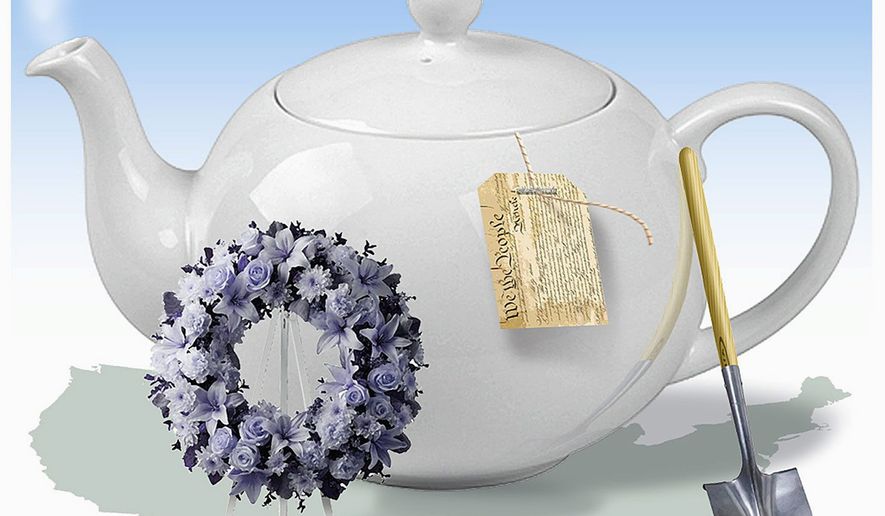OPINION:
With the GOP establishment’s victory of Sen. Pat Roberts in Kansas, many news outlets have begun to beat the drum about the failure of a movement that brought us the likes of Sens. Rand Paul, Marco Rubio, Ted Cruz and other Tea Party candidates.
To be sure, the Tea Party movement has achieved fewer victories at the ballot box this year, but to paraphrase Mark Twain, reports of the Tea Party’s death have been greatly exaggerated.
I sat down with the founder of the Tea Party Express, Sal Russo, to talk about the current state of the movement. Mr. Russo, the powerhouse behind the national bus tour, which began in 2009 at the onset of the Tea Party movement, is responsible for winning a stunning 10 out of 10 targeted races in the 2010 midterm elections. There is little doubt that his organization’s aggressive campaigns played a tremendous role in the GOP takeover of the House of Representatives.
With an A-plus on its 2010 midterm report card, one has to wonder if the Tea Party can sustain a repeat performance in the 2014 midterms.
Outside of the defeat of Rep. Eric Cantor, the primary season was a stormy one for the Tea Party, thanks to the victories of establishment candidates such as Sen. Mitch McConnell, Sen. Thad Cochran, House Speaker John A. Boehner and others.
Early founders of the movement are not worried, however.
A movement is, after all, precisely what the name represents: an effort to move the masses in a completely different direction. Success by that standard is harder to measure in simple win-loss ballot-box figures.
The Tea Party Express’ Mr. Russo contends that despite losing battles in GOP primaries, the Tea Party is winning the broader war: A record number of Americans are now on high alert about taxes, spending and the overall growth of government. Those three tenets are core messages that have been reinforced by the Tea Party movement for five years, since the day CNBC’s Rick Santelli declared war on the establishment from the floor of the Chicago Mercantile Exchange.
For the 2014 midterms, Mr. Russo — whose aim is for his group’s endorsement to serve as a “Good Housekeeping Seal of approval” of sorts for political candidates — has interviewed a whopping 70 candidates in 22 states. However, he suggests victory means not the sheer number of candidates who win or lose (although that’s important), but that existing members of Congress have become more fiscally conservative — more Tea Party-minded, if you will.
Prior to the Tea Party movement, moderate members such as Sen. Susan M. Collins, Maine Republican, were only known back home. Today, they are household names and their telephone lines can be flooded at a moment’s notice with calls from activists — a move that can directly affect votes. It is akin to winning the war without firing a single shot, or spending a single dollar in those districts during an election year.
As for the 2014 midterms, if you view the races for U.S. Senate through Mr. Russo’s lens, you could indeed say the Tea Party has already won. Nearly every candidate — Republican and Democrat — has pledged to limit taxes and limit spending. Mr. Russo claims if there were such a thing as a Tea Party manifesto, they’d all sign it.
Furthermore, the victories aren’t only in the Senate. In the battleground state of Colorado, Democratic congressional candidate Andrew Romanoff — who is running against moderate incumbent GOP Rep. Mike Coffman — has agreed to support a balanced-budget constitutional amendment if elected. By Mr. Russo’s standards, that race is (you guessed it) already a victory.
Despite the media’s attempt to proverbially sign the Tea Party’s death certificate on nightly cable news programs, the evidence is strong to suggest that the Tea Party is not only alive and well, but alive and kicking.
In terms of winning the messaging war, the Tea Party continues to gobble up the airwaves. Immediately following President Obama’s State of the Union address in any given year, one can now find the “Tea Party response” which began in 2011, thanks to Rep. Michele Bachmann, Minnesota Republican. Today, it is rare to turn on Fox News, MSNBC or CNN without some daily discussion about the Tea Party’s reaction to any given topic. In cyberspace, a simple Google search for the term “Tea Party” these days yields thousands of favorable, up-to-the-minute results from reputable news sources, including outlets that Sarah Palin once called “the lame-stream media.”
Dawn Wildman, an early activist with the Tea Party Patriots and now co-founder of the Southern California Tax Revolt group, says that while the movement hasn’t achieved perfection, it has come a long way since then-Speaker of the House Nancy Pelosi called the grass-roots movement “Astroturf.”
“Tea Party activists are independent-minded, well-informed and have a heightened sense of responsibility for the future of this country,” says Ms. Wildman, who has rallied tens of thousands of activists for events and elections since 2009. “If this sort of informed activism isn’t as close to what the Founding Fathers intended, I don’t know what is.”
Jennifer Kerns is a former spokesman for the California Republican Party.




Please read our comment policy before commenting.